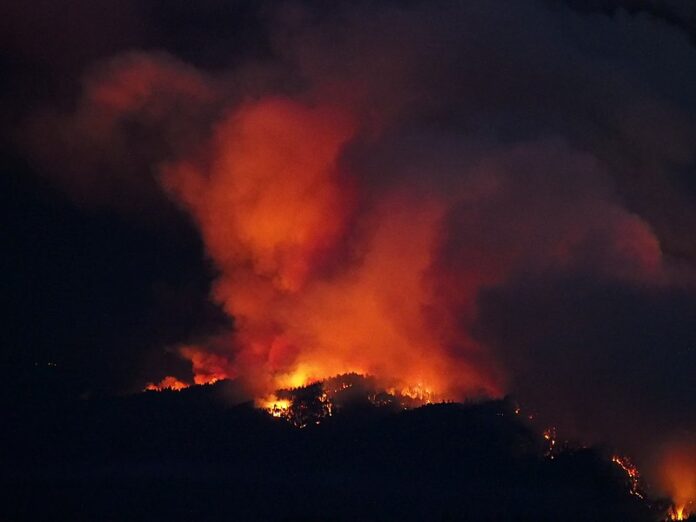Photo from Inklein via Wikimedia Creative Commons
By Nadine Wang and Mark Reynolds
In the home stretch of the 2020 campaign, presidential candidate Joe Biden leaned hard into the issue of climate change, giving a televised climate speech and running climate-focused ads in swing states. His campaign bet that this issue, once considered politically risky, would now be a winner.
That bet paid off. The votes have been tallied, and candidate Biden is now president-elect Biden. But, as is often the case, his party doesn’t have unified control across the whole federal government. President Biden and Vice-President Kamala Harris will govern alongside a Democratic House, a conservative Supreme Court, and a Senate that could either have a slim Republican or Democratic majority. That makes “working together” the order of the day.
Encouragingly, Biden understands that people of any party can and do care about climate change. In a speech this fall, he said, “Hurricanes don’t swerve to avoid red states or blue states. Wildfires don’t skip towns that voted a certain way. The impacts of climate change don’t pick and choose. It’s not a partisan phenomenon, and our response should be the same.”
Some Republicans in the Senate are expressing similar opinions. In October 2020, Senator Lisa Murkowski (R-AK) participated in a climate policy webinar with her climate-hawk colleague, Sen. Sheldon Whitehouse (D-RI). She noted that bipartisanship gives a policy longevity, so she said, “Let’s work in a way that is going to get the support that you need from both Republicans and Democrats.”
These politicians are responding to an incredible swell of public demand for climate action. According to the Yale Program on Climate Change Communication, the number of Americans who are “alarmed” about climate change has more than doubled in recent years, from 11 percent of Americans in 2015 to 26 percent in 2020. All told, 54 percent of Americans are either “alarmed” or “concerned” about climate change. Among Asian Americans, the support for climate action is even higher. In the 2020 Asian American Voter Survey, 77% of Asian Americans agreed with the statement that “Congress and the president should pass stronger legislation to reduce the effects of climate change/global warming.”
Frankly, those numbers make sense. This year has made it starkly obvious that climate change is here and already hurting people. More than five million acres have burned across Western states this year, displacing thousands of people. The Southeast has been battered by a record-breaking hurricane season, where storm after storm makes landfall before communities even have time to recover from the previous one.
Those of us with family in Asia and the Pacific Islands have even more to worry about, since these places will experience disproportionately harsh impacts from climate change. A 2019 study by S. Kulp and B.H. Strauss in Nature Communications estimated that, by the year 2050, homes of as many as 150 million people will be under the water line at high tide due to sea level rise and 70% of these people live in 8 Asian countries. Some Pacific Island nations such as Kiribati are disappearing into the ocean. The strongest storm of 2020, Super Typhoon Goni, hit the Philippines in November, displacing over 300,000 people and killing 20. We need to quickly address the root cause of these terrible phenomena, excess greenhouse gas emissions.

One fast-acting, effective climate policy is a carbon fee on all oil, gas and coal we use in the United States based on the greenhouse gas emissions they produce. Putting a price on pollution will steer our country toward cleaner options, slashing our harmful emissions across many areas of our economy at once. The revenue from this type of policy can be given to Americans on a regular basis—a “carbon cashback” if you will—that would put money in people’s pockets while we transition to a clean-energy economy.
Carbon fee legislation like this exists in Congress now: the Energy Innovation and Carbon Dividend Act (H.R. 763) has support from people and organizations across the political spectrum, including numerous prominent Asian Americans. Former presidential candidate Andrew Yang made a carbon fee with a “cashback” dividend a feature of his campaign platform. Nobel laureate and former Energy Secretary, Dr. Steven Chu, has endorsed H.R. 763. Representatives Judy Chu, Grace Meng, Ami Bera, Ted Lieu and 23 other members of the Congressional Asian Pacific American Caucus have co-sponsored the bill.
Our community is ready for Congress to push forward to make this legislation the law of the land. Too often, Asian Americans have stayed silent, but climate change is an urgent threat to our communities, and we should make our voices heard. Let’s contact our members of Congress to tell them we are concerned about climate change and support this important climate legislation. Now is the time to act.
Mark Reynolds is the executive director of Citizens’ Climate Lobby, a non-partisan, grassroots advocacy organization working to generate the political will for a livable world. Nadine Wang, Ph.D., is a Citizens’ Climate Lobby volunteer and co-leader of its Asian Pacific Action Team.


